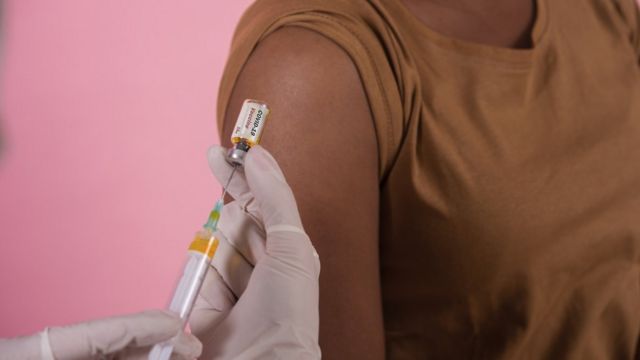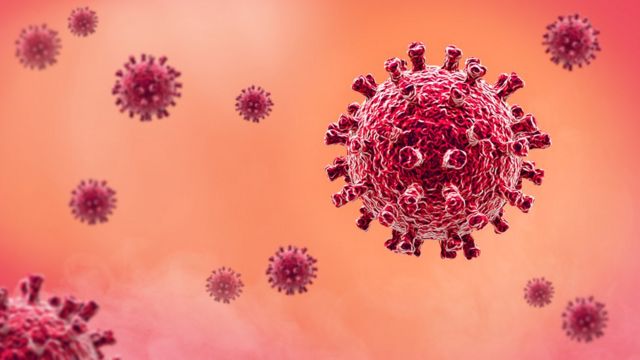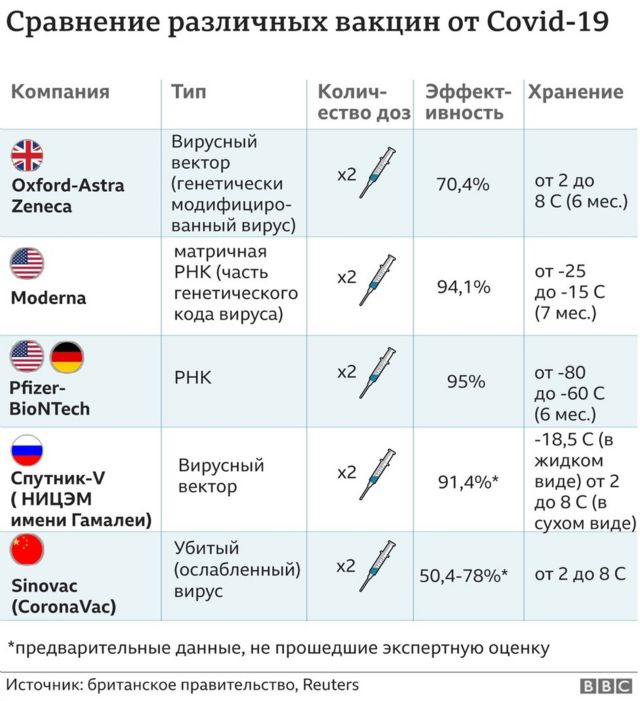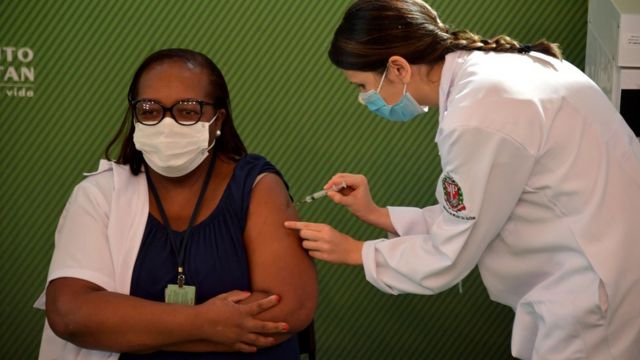43 minutes ago
Photo author, Getty Images
—
The vaccine prepares the body to fight a particular type of infection or virus
–
A mass vaccination program has been launched around the world to curb the Covid-19 pandemic. There is a lot of information on this topic, but sometimes it is very difficult to understand it.
–
We have compiled a selection of basic facts about what a vaccine is, in principle, as a type of medicine and how it affects the human body.
–
What is a vaccine?
The vaccine prepares the body to fight against the causative agent of a particular infection – a specific virus or bacterium. Vaccines contain inactivated (killed) or weakened microorganisms that cause disease, or their fragments.
–
This forces our immune system, firstly, to recognize the invading enemy, and, secondly, to produce antibodies in order to learn how to fight it. You won’t get sick from the shot itself, but some people may have a reaction to it, such as pain (or swelling) at the injection site or even a mild fever.
–
But you gain immunity to this disease.
–
That is why vaccines are such a powerful way to fight various diseases: they do not cure the disease, but prevent its development.
–

Photo author, Getty Images
—
Vaccination is the administration of a vaccine designed against a specific virus or some specific infection
–
Is immunization safe?
Vaccination as a way to prevent the disease was known in China as early as the 10th century, but the English physician Edward Jenner became the pioneer of vaccination, who in 1796 noticed that the vaccinia virus, easily transmitted by humans, provides protection against smallpox.
–
He tested this theory in practice, for example, having made, for example, one of the first inoculations of the eight-year-old son of his gardener with the help of the contents of a sore cowpox, which infected his thrush.
–
Jenner published his observations two years later in the scientific journal of the Royal Scientific Society, and thus the word “vaccination” came about – from the Latin word vacca, meaning cow.
–
The invention of vaccination is considered one of the most ambitious achievements of modern medicine; precisely thanks to vaccines, according to WHO, it is possible to prevent the death of 2-3 million people annually.
–
The US Centers for Disease Control and Prevention says that before any vaccine is released into the market, it undergoes rigorous testing in the laboratory and in animals, and then clinical trials in human volunteers, after which the vaccines are approved by the regulatory authorities.
–
Like any medicine, the vaccine may not be completely safe, but the benefits of its use far outweigh the possible risks.
–
 —
—
–
For example, childhood illnesses, which were very common only a generation ago, are becoming rare precisely because of vaccinations. Smallpox, which claimed the lives of hundreds of millions of people, has been completely destroyed.
–
However, sometimes the path to victory over this or that disease lasts for many decades. Africa was declared polio free only in August 2020 – 30 years after the start of a mass vaccination campaign.
–
Experts warn that it can take many months, if not years, to vaccinate our planet against Covid-19 on a scale that will bring life back to normal.
–

Photo author, Keystone-France/Getty Images
—
Smallpox vaccination, 1962
–
How are vaccines made?
When a new pathogen – a harmful bacterium, virus or fungus – enters the body, antigens, that is, specific substances inherent only to these microorganisms, immediately cause a protective reaction of antibodies – specific molecules produced by blood cells and dissolved in it.
–
Traditional vaccines are designed by introducing weakened particles of a specific antigen into the body – to familiarize the body with this pathogen before it picks it up under normal circumstances.
–
The defense is then developed that the immune system reacts to such a safe acquaintance in the same way as if it happened with a real, aggressive pathogen.
–
However, some anti-toxic vaccines are produced in a completely new way.
–

Photo author, Cavan Images/Getty Images
—
New methods have been used for some anti-toxic vaccines
–
What is the difference between the available Covid-19 vaccines?
The vaccines developed by Pfizer-BioNTech and Moderna use part of the coronavirus’s genetic code, its messenger RNA.
–
Instead of launching a weakened virus into the body, this vaccine forces our body’s cells to produce the same spike protein found on the surface of the virus that causes Covid-19 and trigger an immune response to form antibodies to fight it.
–
 —
—
–
 —
—
–
The vaccine, developed by Oxford University in conjunction with AstraZeneca, works on a different principle: here scientists took a slightly modified common adenovirus that causes the common cold in chimpanzees and inserted a fragment of the genetic code of the new coronavirus into it.
–
All three vaccines have been approved for use in Britain and the United States.
–
Mexico and Costa Rica have already started vaccinations with Pfizer, while Brazilian authorities have given the green light to both the Oxford vaccine and CoronaVac from China’s Sinovac.
–
What other vaccines are there?

Photo author, Getty Images
—
Nurse Monica Calazan receives first coronavirus vaccine in Brazil
–
CoronaVac, produced by the traditional method using a neutralized virus, is now being used in the PRC, Singapore, Malaysia, Indonesia and the Philippines.
–
However, its effectiveness has been called into question during late-stage trials in Turkey and Indonesia, as in Brazil, where scientists have stated that it is only 50.4% effective.
–
India is launching two vaccines – one developed by AstraZeneca and the University of Oxford (where it is known as Covishield), and Covaxin, developed by local firm Bharat Biotech.
–
Russia is using its Sputnik V vector vaccine, which has also been ordered by several countries – for example, Argentina bought 300,000 doses for the initial stage of immunization, and the country’s president even got a Sputnik vaccine in public to set an example for other citizens.
–
The African Union has ordered 270 million doses from a number of suppliers – Pfizer, AstraZeneca (through the Indian company Serum Institute of India) and Johnson & Johnson, which is still testing its vaccine.
–
This is in addition to the 600 million doses to be donated through the global Covax project, sponsored by WHO and the Gavi alliance, which aims to ensure access to antibiotic vaccines for the world’s poorest countries.
–
Should I get vaccinated?

Photo author, Getty Images
—
Group immunity will help to return to normal life
–
While vaccination against Covid-19 is not mandatory in any country in the world, however, experts strongly recommend vaccinating most of the adult population – with the exception of those who may be contraindicated for health reasons.
–
This, experts say, is the only surefire way to end the pandemic.
–
The WHO estimates that 65% to 70% of people must be immune before the chain of transmission is interrupted.
–
Some people are questioning the unprecedented speed with which antioxidant vaccines have been developed.
–
Indeed, scientists usually spend years developing new vaccines, but in a pandemic and with the active collaboration of scientists from different countries under the auspices of WHO, this became possible in a much shorter time frame. At the same time, it is worth noting that the last, third phase of clinical trials has not yet been completed with a single vaccine, so all the announced results are preliminary.
–
To summarize, we can say this: Vaccinating billions of people will help stop the transmission of the virus that causes Covid-19 and achieve group immunity.
–
Once we achieve this, we can return to normal life.
—


